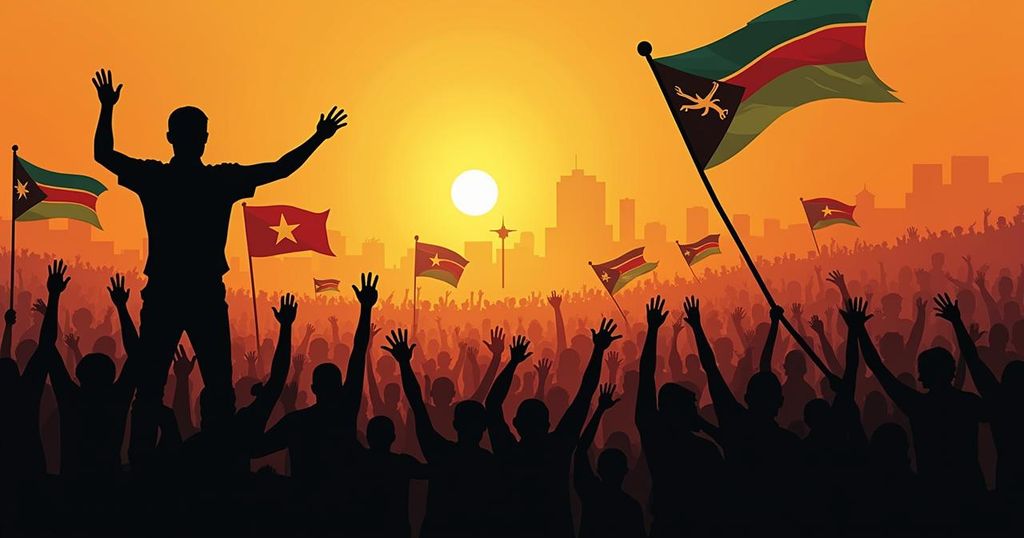Mozambique: Ruling Party Set to Continue Dominance in Upcoming Elections

Mozambique’s ruling party, Frelimo, is expected to maintain its dominance in the upcoming elections set for October 9, 2024. President Filipe Nyusi’s successor, Daniel Chapo, is campaigning vigorously, while opposition candidates like Ossufo Momade and Lutero Simango struggle to gain traction. The fragmented opposition has failed to present a united front, leaving Chapo in a strong position. The election commission reports preparedness for the elections, with over 17 million registered voters.
In Mozambique’s political landscape, the ruling party, Frelimo, appears poised for continued dominance in the upcoming election, building on its nearly half-century grip on power. The capital, Maputo, is awash in Frelimo’s iconic red banners, particularly since the official campaign launch on August 24. As the party searches for a successor to President Filipe Nyusi, who is ineligible to run for a third term, they have selected Daniel Chapo, a 47-year-old former governor of Inhambane province. Chapo’s image is ubiquitous across major cities, alongside Frelimo’s symbols of resilience and historical significance. However, the opposition, fractured and lacking cohesion, struggles to compete effectively against Frelimo’s prominent presence. Among the 36 parties contesting for the 250 parliamentary seats, the challengers have limited visibility and face an uphill battle. Prominent opposition candidates include Ossufo Momade of Renamo and Lutero Simango from the Democratic Movement of Mozambique (MDM). Despite initial expectations, Momade has struggled to galvanize significant support, being criticized for a perceived lack of ambition. In contrast, Simango has emphasized systemic reforms required to foster a more inclusive and democratic Mozambique but lacks the momentum to challenge Frelimo’s entrenched authority. Venancio Mondlane presents an interesting figure in this electoral dynamic. Formerly associated with Renamo, he has positioned himself as a populist leader advocating for change, despite his exclusion from the formal election process due to alleged procedural failures by the National Election Commission. He remains undeterred, vowing to resist the existing power structures. The election commission, led by spokesperson Paulo Cuinica, has assured that they are adequately prepared for the elections scheduled on October 9, emphasizing the absence of significant logistical issues. With over 17 million Mozambicans registered to vote, including citizens abroad, there is widespread anticipation that Daniel Chapo will emerge as the next president of Mozambique, maintaining Frelimo’s longstanding legacy of leadership.
The political climate in Mozambique is characterized by the dominance of Frelimo, the ruling party since independence in 1975. With the upcoming elections set for October 9, 2024, the party’s campaign efforts and candidate selection are critical as they navigate the challenge of presenting a fresh face in Daniel Chapo, following President Filipe Nyusi’s two-term presidency. The opposition landscape highlights fragmentation, with multiple parties vying for attention but lacking unified strength against Frelimo’s pervasive influence. This context sets the stage for analyzing candidate strategies, public sentiment, and the electoral process within Mozambique.
In conclusion, Mozambique’s upcoming elections will likely see Frelimo’s candidate Daniel Chapo continue the party’s longstanding rule, amid a backdrop of weak and divided opposition. The challenges faced by candidates like Ossufo Momade and Lutero Simango, alongside the tumultuous journey of Venancio Mondlane, underscore the complexities within Mozambique’s political fabric. The role of the National Election Commission in ensuring a fair electoral process will be critical in shaping the democratic future of the nation as over 17 million voters prepare to cast their ballots.
Original Source: www.dw.com







